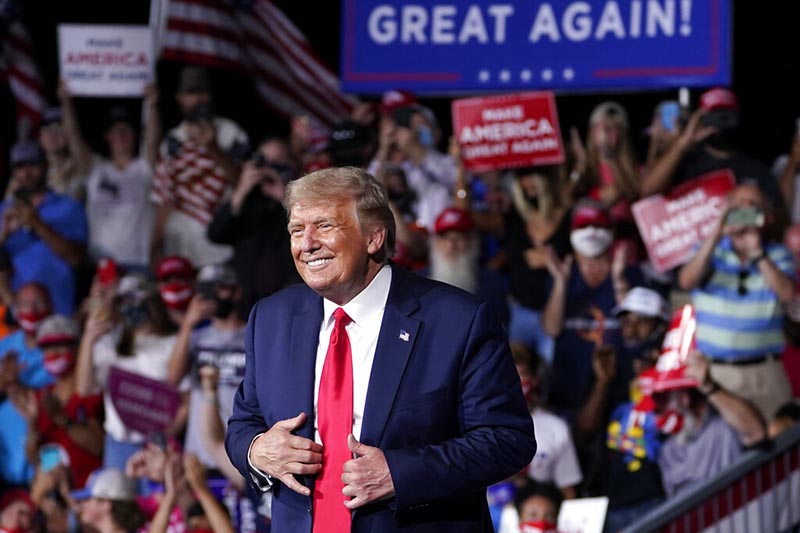Trump and Biden run vastly different pandemic campaigns
WINSTON-SALEM, NORTH CAROLINA: North Carolina caps outdoor gatherings at 50 people to prevent the spread of the novel coronavirus, but don't tell that to President Donald Trump. He basked in a largely maskless crowd of several thousand supporters during a Tuesday rally in this critical battleground state.
“As far as the eye can see,” Trump said, reveling at the sight of people flouting public health guidelines. “I really believe that these crowds are bigger than they were four years ago.”
A day earlier in Pennsylvania, Trump's Democratic challenger, Joe Biden, held a socially distanced meeting in a backyard. His team has been so attentive to local regulations that some staffers have left the room if they risked breaking the rules on crowd limits.
“I really miss being able to, you know, grab hands and shake hands," Biden recently told supporters. "You can’t do that now.”
With less than eight weeks until Election Day, Trump and Biden are taking diametrically opposite approaches to campaigning during a pandemic — and the differences amount to more than political theater. The candidates are effectively staking out different visions for the country with Biden emphasizing guidelines supported by local health officials while Trump rails against restrictions that he argues — without evidence — are politically motivated.
“By the way, your state should be open,” Trump said in North Carolina — a state where he has feuded with Gov. Roy Cooper, a Democrat, over his abandoned plans to hold the Republican National Convention in Charlotte. “It’s you, it's Michigan, it’s a couple others,” Trump added, as he sees a potent line of attack in battleground states run by Democrats.
Trump aides and allies suggest the president sees his rallies as a manifestation of the reopening he’s preaching — and that he believes is vital to the nation’s economic recovery and what voters want. In a dig at those who warn against reopening too quickly, Trump suggested that these states would suddenly reopen the day after the election — when opponents advocating caution can no longer hurt his reelection.
Outdoor events used to be few and far between for Trump, who prefers the deafening echo and air conditioning of indoor arenas. But in the wake of a June rally in Tulsa, Oklahoma, when the president addressed a half-empty arena and a promised five-figure overflow crowd never materialized, his campaign decided to move to lower-stakes airport hangars and tarmacs.
The one thing that has stayed the same: crowing about his crowd sizes in comparison to Biden's.
“If he had 200 people, I think it would be a lot,” Trump said Tuesday of his opponent. “Have you ever seen the gyms with the circles? That’s his crowd. If he had 200 people.”
Biden’s crowds, in fact, have been far smaller. The former vice president has appeared in public only sparingly since the pandemic hit — and with the strictest adherence to state guidelines: 25 people in Pennsylvania, 50 in Michigan and mandatory face-coverings all around. Biden’s approach reflects the reluctance of many of his supporters to attend large gatherings.
For someone who has never been a natural in an arena, the smaller events allow Biden to have more personal interactions with representatives from key voting blocs, like labor and community leaders.
But they also allow him to largely avoid any controversy created by a critical questioner or a protester, both of whom he was forced to grapple with multiple times on the campaign trail before the pandemic struck.
Even when Biden is confronted with organic crowds of supporters, he’s rarely given the opportunity for an unscripted interaction with them.
As Biden gave a speech last week focused on the Trump administration’s response to the coronavirus at a university building in Pittsburgh, a crowd of more than 100 gathered and continued to arrive even as his event wrapped up.
They chanted “We want Joe!” and waved Biden signs, some of them homemade. But, after his speech, Biden remained inside the building to attend a virtual fundraiser, then abruptly left to pass out pizzas at a nearby firehouse without approaching the supporters.
Three days later, after Biden visited Kenosha, Wisconsin, he and his wife, Jill, stopped at the home of a supporter in Wauwatosa, a leafy Milwaukee suburb.
With so many people confined to their homes, the presence of Biden’s motorcade on a small street drew more than 200 people out onto their porches or the street. The Bidens spent more than half an hour meeting in a quiet back patio with two teachers and a parent concerned about how to resume in-person learning during the pandemic.
The crowd cheered and chanted “Go Joe!,” but the private meeting ran so long that Biden only interacted with them for less than a minute. As he was leaving, he walked to the middle of the street and then, surrounded by Secret Service agents, bellowed, “Don’t forget to vote!”
Earlier this week, however, Biden took a moment after an event focused on labor leaders at a supporter’s house in Lancaster, Pennsylvania, to greet a crowd of about two dozen supporters that had assembled across the street. Flanked by Secret Service agents, Biden said a few words to the crowd about his belief that Americans can do anything when they’re unified and about the need to vote, then spoke briefly to reporters and departed.
Later that day, Biden waved at a crowd of about 100 from the window of the AFL-CIO Pennsylvania headquarters, but declined to come any nearer after leaving the building.






